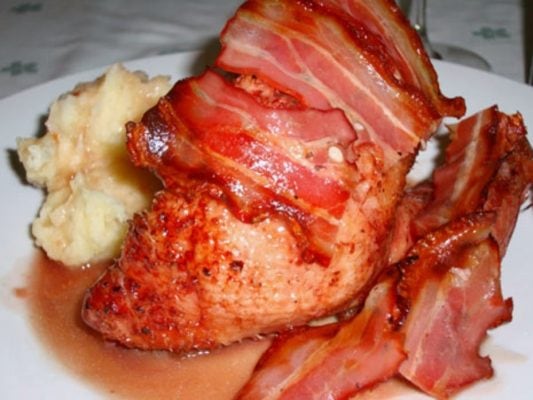Este pato assado com vinho do Porto é um prato de requinte e sabor intenso, perfeito para uma ocasião especial ou um jantar de celebração. A combinação da carne suculenta do pato com o molho agridoce, enriquecido pelo vinho do Porto e pelo toque amargo do doce de laranja, cria uma experiência gastronómica memorável. É um prato principal que promete ser o centro das atenções e encantar os seus convidados.
Ingredientes
- 1 pato inteiro
- Sal grosso q.b.
- Pimenta preta moída na hora q.b.
- Óleo para untar
- Tiras finas de bacon q.b.
- 1 dl de água quente
- 1,5 dl de vinho do Porto LBV
- Sumo de 1 limão
- 2 colheres de sopa de doce de laranja amarga
- Sumo de 1/2 laranja grande
- Molho inglês q.b.
Preparação
- Lave o pato e seque-o com papel absorvente.
- Tempere com sal grosso e pimenta preta moída na hora.
- Coloque o pato num tabuleiro untado com óleo e leve ao forno pré-aquecido a 180 °C durante 30 minutos.
- Retire o tabuleiro, cubra o pato com tiras finas de bacon, junte 1 dl de água quente e leve novamente ao forno por mais 30 minutos.
- Faça um golpe no peito do pato, de cima a baixo, regue com o vinho do Porto e o sumo de 1 limão, e leve ao forno por mais 15 minutos.
- Retire o pato do forno e coe o molho para um tacho pequeno. Deixe o pato e o bacon no forno desligado para manterem o calor.
- Leve o molho ao lume, junte o doce de laranja amarga, o sumo de 1/2 laranja e um pouco de molho inglês. Deixe ferver por 3 minutos.
- Sirva o pato fatiado, acompanhado com o molho quente.
For a truly elegant centerpiece for your next special meal, here is the English version of this recipe.
Roasted Duck with Port Wine
Roasted duck is a dish that always feels like a celebration, and this Portuguese recipe elevates it to another level with a luxurious sauce made from Port wine and bitter orange marmalade. The rich, fatty meat of the duck becomes incredibly tender and flavourful during roasting, while the bacon strips laid over the top not only add flavour but also keep the breast meat moist and succulent.
The star of the show, however, is the pan sauce. A beautiful blend of sweet, rich Port wine, the tangy juice of fresh oranges, and the complex bitterness of marmalade creates a perfectly balanced sauce that cuts through the richness of the duck wonderfully. A final dash of Worcestershire sauce adds a savoury depth, rounding out the flavours. This dish is perfect for a festive dinner or a sophisticated Sunday lunch, served alongside roasted potatoes or a creamy potato gratin.
Ingredients
- 1 whole duck
- Coarse sea salt, to taste
- Freshly ground black pepper, to taste
- Oil, for greasing
- Thin strips of bacon
- 100ml hot water
- 150ml LBV (Late Bottled Vintage) Port wine
- Juice of 1 lemon
- 2 tbsp bitter orange marmalade
- Juice of 1/2 large orange
- A dash of Worcestershire sauce
Method
- Preheat your oven to 180°C (350°F / Gas Mark 4). Wash the duck inside and out and pat it dry with paper towels.
- Season the duck generously all over with coarse sea salt and freshly ground black pepper.
- Place the duck in an oil-greased roasting tin and roast for 30 minutes.
- Carefully remove the tin from the oven. Cover the duck breast with the thin strips of bacon, add 100ml of hot water to the bottom of the tin, and return it to the oven for another 30 minutes.
- Make a single, deep cut down the length of the duck breast. Pour the Port wine and the lemon juice over the duck and return it to the oven for a final 15 minutes.
- Remove the duck from the oven. Carefully strain all the pan juices into a small saucepan. Keep the duck and bacon in the turned-off oven to stay warm.
- Bring the sauce to a simmer over a medium heat. Stir in the bitter orange marmalade, the orange juice, and a dash of Worcestershire sauce. Let it boil for about 3 minutes until it has slightly thickened.
- Carve the duck and serve it sliced, accompanied by the hot sauce.
